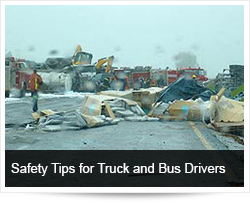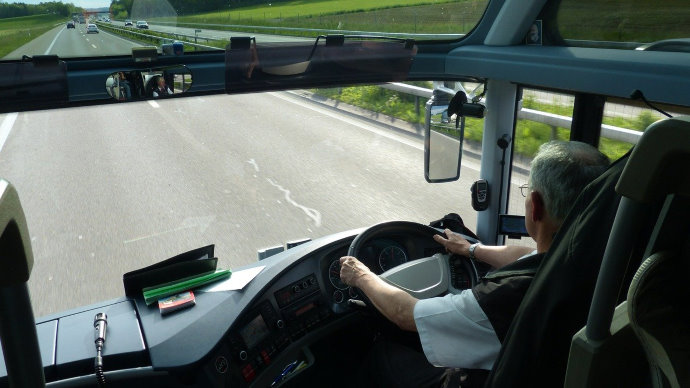 Take Care of Yourself
Take Care of Yourself
The most important part of a moving truck or bus is the driver!
Get plenty of rest before getting behind the wheel. Eat well and stay fit. Remember, hours of service violations are serious and can threaten your livelihood or even your life.
Stay healthy and well-rested, or don't drive!
Always Maintain Your Vehicle
Inspect your vehicle before each trip and check your brakes regularly. Learn how to inspect your brakes, identify safety defects, and get them repaired before risking your life and others on the highway.
Be Aware of Your "No-Zone"
Other drivers may not be aware of the size of your truck's blind spots. Be vigilant in watching out for vehicles in the No-Zone. The No-Zone represents the danger areas, or blind spots, around trucks and buses where crashes are more likely to occur. One-third of all crashes between large trucks and cars take place in the No-Zone.
Slow Down in Work Zones
Watch out for highway construction. Stay alert. Work zone crashes are more likely to happen during the day. Almost one-third of fatal crashes in work zones involved large trucks. Take your time going through work zones and give yourself plenty of room. Expect the unexpected!

Always Keep Your Distance
Always leave enough space between you and the vehicle in front of you. If you hit someone from behind, you are typically considered "at fault," regardless of the situation. Large trucks require more stopping distances than other vehicles. Take advantage of your driving height, and anticipate braking situations.
Fasten Your Seatbelt
Buckle up for safety and control. If you are in a crash, a seat belt can save your life and those around you. It will keep you in your seat and allow you to maintain control of your truck or bus. A major cause of truck and bus driver fatalities involves being ejected from the vehicle. Wearing seat belts, is still the single most effective thing all drivers can do to save lives and reduce injures on our roadways.
Always Drive Defensively
Avoid aggressive drivers! It's estimated that each year two-thirds of all traffic fatalities are caused by aggressive driving behaviours. Keep your distance and maintain a safe speed. The only thing speed will increase is your chance for a crash.
Work to Help Yourselves
Be the professional on the highway and at safety events! Help stranded motorists; notify traffic safety agencies of crashes, unsafe drivers, unsafe roadway conditions, and other situations that can lead to crashes. Your participation in public safety events and your performance on the highway can change public perception!
Tell Us What is Wrong
If you know of unsafe situations, tell us about it. This includes unsafe companies, unsafe drivers, unsafe roadways, and unsafe vehicles.

Also, visit the following sections:
Bus Industry in South Africa and Road Safety
Bus Safety / Truck Safety
A new standard for fire suppression systems in engine compartments of buses and coaches